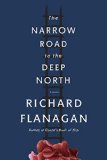Summary | Excerpt | Reading Guide | Reviews | Beyond the Book | Readalikes | Genres & Themes | Author Bio

Critics' Opinion:
Readers' Opinion:
First Published:
Aug 2014, 352 pages
Paperback:
Apr 2015, 352 pages
 Book Reviewed by:
Book Reviewed by:
Alta Ifland
Buy This Book
Hold still, she said, taking hold of his hand with such a strong grip it shocked him.
Jackie Maguire was telling how he had taken the mail train to Launceston and gone looking for her, but he could find her nowhere. As Dorrigo Evans watched, the red-hot tip touched his nail and it began to smoke as his mother burnt a hole through the cuticle. He heard Jackie Maguire say—
She's vanished off the face of the earth, Mrs Evans.
And the smoke gave way to a small gush of dark blood from his thumb, and the pain of his blood blister and the terror of the red-hot carving knife were gone.
Scram, Dorrigo's mother said, nudging him off the table. Scram now, boy.
Vanished! Jackie Maguire said.
All this was in the days when the world was wide and the island of Tasmania was still the world. And of its many remote and forgotten outposts, few were more forgotten and remote than Cleveland, the hamlet of forty or so souls where Dorrigo Evans lived. An old convict coaching village fallen on hard times and out of memory, it now survived as a railway siding, a handful of crumbling Georgian buildings and scattered verandah-browed wooden cottages, shelter for those who had endured a century of exile and loss.
Backdropped by woodlands of writhing peppermint gums and silver wattle that waved and danced in the heat, it was hot and hard in summer, and hard, simply hard, in winter. Electricity and radio were yet to arrive, and were it not that it was the 1920s, it could have been the 1880s or the 1850s. Many years later Tom, a man not given to allegory but perhaps prompted, or so Dorrigo had thought at the time, by his own impending death and the accompanying terror of the old—that all life is only allegory and the real story is not here—said it was like the long autumn of a dying world.
Their father was a railway fettler, and his family lived in a Tasmanian Government Railways weatherboard cottage by the side of the line. Of a summer, when the water ran out, they would bucket water from the tank set up for the steam locomotives. They slept under skins of possums they snared, and they lived mostly on the rabbits they trapped and the wallabies they shot and the potatoes they grew and the bread they baked. Their father, who had survived the depression of the 1890s and watched men die of starvation on the streets of Hobart, couldn't believe his luck at having ended up living in such a workers' paradise. In his less sanguine moments he would also say, 'You live like a dog and you die like a dog.'
Dorrigo Evans knew Jackie Maguire from the holidays he sometimes took with Tom. To get to Tom's he would catch a ride on the back of Joe Pike's dray from Cleveland to the Fingal Valley turnoff. As the old draught horse Joe Pike called Gracie amiably trotted along, Dorrigo would sway back and forth and imagine himself shaping into one of the boughs of the wildly snaking peppermint gums that fingered and flew through the great blue sky overhead. He would smell damp bark and drying leaves and watch the clans of green and red musk lorikeets chortling far above. He would drink in the birdsong of the wrens and the honeyeaters, the whipcrack call of the jo-wittys, punctuated by Gracie's steady clop and the creak and clink of the cart's leather traces and wood shafts and iron chains, a universe of sensation that returned in dreams.
They would make their way along the old coach road, past the coaching hotel the railway had put out of business, now a dilapidated near ruin in which lived several impoverished families, including the Jackie Maguires. Once every few days a cloud of dust would announce the coming of a motorcar, and the kids would appear out of the bush and the coach-house and chase the noisy cloud till their lungs were afire and their legs lead.
At the Fingal Valley turnoff Dorrigo Evans would slide off, wave Joe and Gracie goodbye, and begin the walk to Llewellyn, a town distinguished chiefly by being even smaller than Cleveland. Once at Llewellyn, he would strike north-east through the paddocks and, taking his bearings from the great snow-covered massif of Ben Lomond, head through the bush towards the snow country back of the Ben, where Tom worked two weeks on, one week off as a possum snarer. Mid-afternoon he would arrive at Tom's home, a cave that nestled in a sheltered dogleg below a ridgeline. The cave was slightly smaller than the size of their skillion kitchen, and at its highest Tom could stand with his head bowed. It narrowed like an egg at each end, and its opening was sheltered by an overhang which meant that a fire could burn there all night, warming the cave.
Excerpted from The Narrow Road to the Deep North by Richard Flanagan. Copyright © 2014 by Richard Flanagan. Excerpted by permission of Knopf, a division of Random House LLC. All rights reserved. No part of this excerpt may be reproduced or reprinted without permission in writing from the publisher.




You can lead a man to Congress, but you can't make him think.
Click Here to find out who said this, as well as discovering other famous literary quotes!
Your guide toexceptional books
BookBrowse seeks out and recommends the best in contemporary fiction and nonfiction—books that not only engage and entertain but also deepen our understanding of ourselves and the world around us.